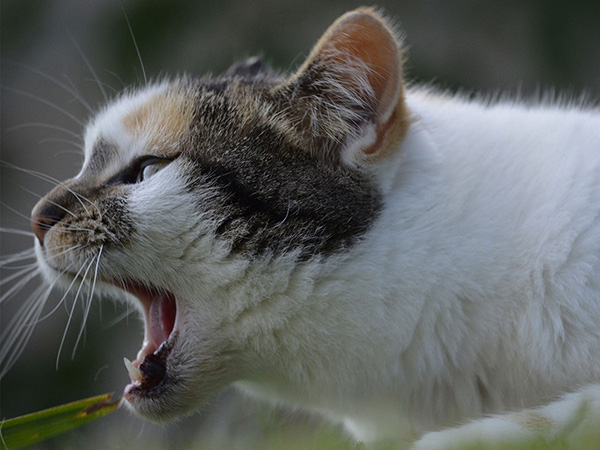Unraveling the Mystery: The Causes of a Cough in a Dog or Cat
|
Feb 7, 2024 - By the dedicated team of editors and writers at Newsletter Station.

|
We all know that a persistent cough can be quite bothersome for humans and our beloved pets. If you've ever heard your dog or cat coughing, you may have wondered what could be causing it. Coughing in pets can be induced by various factors, ranging from minor irritations to more serious underlying health issues.
In this blog, we'll explore some common causes of coughing in dogs and cats, helping you better understand when to seek veterinary care and how to keep your furry friend healthy.
- Respiratory Infections
Respiratory infections are the most common cause of coughing among dogs and cats. These infections can be viral or bacterial and affect the upper or lower respiratory tract. Common culprits include the canine and feline flu, kennel cough, and pneumonia. Symptoms may include a dry or moist cough, sneezing, nasal discharge, and, sometimes, fever. Respiratory infections should not be taken lightly, as they can lead to more severe complications if left untreated. Your veterinarian can diagnose the specific condition and prescribe appropriate treatment, including antibiotics or antiviral medications.
- Allergies
Just like humans, dogs and cats can also suffer from allergies. Allergens such as pollen, dust mites, mold spores, and certain foods can trigger an allergic response that leads to coughing. Other symptoms like itching, watery eyes, and skin problems often accompany allergic coughs. If possible, identifying and avoiding the allergen can help alleviate your pet's symptoms. Your veterinarian may sometimes recommend allergy testing, antihistamines, or other allergy medications.
- Heart Disease
Coughing can be a symptom of heart disease in both dogs and cats. Heart-related coughs are typically characterized by a soft, moist cough that worsens when the pet lies down. This is because fluid can accumulate in the lungs when the heart is not pumping efficiently, leading to coughing and difficulty breathing. Heart disease can be prevalent in older pets, and early detection is crucial. Your vet may recommend medications and dietary changes to manage the condition and improve your pet's quality of life.
- Collapsing Trachea
Some small dog breeds, such as Chihuahuas and Yorkshire Terriers, are prone to a condition known as a collapsing trachea. This is when the cartilage rings that support the trachea weaken, causing the trachea to collapse and obstruct the airflow. Coughing, especially when excited or during physical activity, is a common symptom. Treatment options can include medications, weight management, and sometimes surgery in severe cases.
- Foreign Objects or Irritants
Dogs and cats are naturally curious animals; sometimes, they inhale or swallow foreign objects or irritants that can cause coughing. Common culprits include grass, small toys, or even hairballs in cats. If your pet's coughing is sudden and seems related to something they may have ingested or inhaled, it's essential to consult your veterinarian. In some cases, a simple procedure may be required to remove the foreign object.
A cough in your dog or cat should not be ignored, as it can be a sign of various underlying health issues. While some causes of coughing may be minor and resolve independently, others can be serious and require prompt veterinary attention. Regular check-ups with your veterinarian, a clean and safe environment, and a healthy diet can all contribute to your pet's overall well-being and reduce the risk of coughing episodes.
Remember that early detection and intervention are crucial in managing any health condition, ensuring your furry friend enjoys a happy and cough-free life.
Unlock the Power of Email Marketing
Harness the potential of email marketing with Newsletter Station. Reach your target audience, drive conversions, and achieve your business goals.
|
More Blogs
| May 8, 2024 |
How to Protect Your Dog's Paws: Tips for a Happy and Healthy Furry Friend
|
| May 1, 2024 |
Tips for Removing a Tick from Your Pet
|
| Apr 24, 2024 |
How to Know When It Is Too Hot to Walk Your Dog
|
| Apr 17, 2024 |
What to Do When Your Pet Isn't Eating
|
| Apr 10, 2024 |
What Causes Bad Breath in Dogs and Cats?
|
| Apr 3, 2024 |
What Causes Cysts in Dogs: Understanding Canine Cyst Formation
|
| Mar 26, 2024 |
Toxic Plants for Cats: Protecting Your Feline Friends
|
| Mar 20, 2024 |
Reasons Your Dog Is Licking Its Paws
|
| Mar 13, 2024 |
Ways to Deal with Dog Separation Anxiety
|
| Mar 6, 2024 |
Identifying Food Allergies in Dogs and Cats
|
| Feb 28, 2024 |
Spotting the Early Signs of Dementia in Your Aging Dog
|
| Feb 21, 2024 |
How Safe is Pet Hair Dye?
|
|
|
|